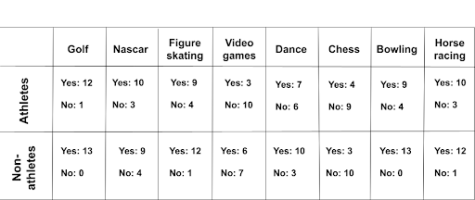What is a Sport?
October 15, 2022
It’s no question that sports are, and will continue to be, a relevant part of our society for many decades. According to the CDC, over 57% of high schoolers in the U.S. play at least one sport, and according to data from the National Federation of State High School Associations, American football is the most popular sport among boys, and outdoor track and field is the most popular among girls. Looking at the juggernauts of media professional leagues like the NBA, NBL, and NFL, it is clear that all these popular activities are no doubt sports, but what about other activities? With something as respected and popular in our culture as sports, in my experience at least, many other activities want to also put themselves under the category of athletes, and with so many different things trying to gain this title, it is time to consider the question: What is a sport? I interviewed 13 Abington High School student-athletes and 13 Abington High School non-athlete students to see how people’s definitions differed from mine.
Interviews between all 26 students had the exact same questions, but data was separated depending on if the interviewee played a sport to see if there was any correlation between athletes’ and non-athletes’ answers. I gave people a questionnaire with 8 activities listed, and they were asked to decide if each one was a sport or not. The activities listed were ones I frequently hear questioned if it is a sport or not, with some being in much more or less contention than others (e.g. golf vs. video games). Here are the results. 
Right off the bat, it is clear that it was more common for athletes to say an activity wasn’t a sport than the non-athletes. My guess is that the people who play sports might feel more strongly about what is considered a sport because they are involved in them, or that most of the people considered athletes in this survey played more traditional sports and therefore considered more activities not traditionally classified as a sport, not a sport. As a student-athlete myself, I can say that I would consider less of these activities a sport than many of the non-athletes interviewed.
Golf and bowling were meant to be the least controversial activities in the survey. Other than being considered sports for decades, and having multiple national and international leagues, they take physical technique, precision, strategy, and skill to succeed. For the one athlete who disagreed with golf and the four who disagreed with bowling being a sport, this was most likely because while both these activities require physical skill, they aren’t very physically intense. If you are a pro-golfer, you will need a strong upper body and lower body strength to hit the ball far and accurately, but you won’t exactly be drenched in sweat and hyperventilating at the end of the course. The fact that it’s not physically intense might make some people not consider these activities sports, but I personally don’t think an activity needs to be physically intense to be a sport.
While figure skating and dance are very similar in terms that figure skating is basically just dancing on ice, both activities require vastly different skills and techniques. Despite their similarities, figure skating was considered to be a sport by more people than dance. My guess for this gap in recognition is that while dance has been accepted into the Olympics, it has not been around nearly as long as figure skating, which was first introduced in 1908 and is more popular than many other dance-based events at the Olympics. One interesting argument against dance that I heard was that it is an art, not a sport. Where in soccer, football, tennis, lacrosse, and basketball, the winner is decided by the number of points, which are given to a team by a set amount when they accomplish a specific goal, dance and figure skating have judges that score people on the quality of their acts of creative expression. While I do agree with this point of view, I don’t think it rules dance-based activities out of being considered sports. While they are based on skills to produce a work of art, the skills needed do require intense physical athleticism and activity.
Chess and video games were expected to be, and were, the least supported and most controversial activities in the survey. I am positive this is because both require little to no physical exertion to succeed. It doesn’t help that one of the most common stereotypes for professional video game players and chess players is that they are specifically unathletic. Starting with chess, there is no doubt in most people’s minds that it does take skill, but it does not take any relevant physical mastery. The most physical activity you do in chess is moving the pieces, and while it can be exhausting to play a whole chess tournament, it’s still not physically using your muscles or heart significantly, which is why I personally don’t think it is a sport. Despite it receiving less overall support for being a sport than any other activity in the survey, it still got more support than expected, and it surprisingly got more support from athletes than non-athletes. Some may consider chess a sport because it is one of the most competitive, respected, and skill-based games out there that has been played since 600 AD.
Video games on the other hand struggle with this aspect. Video games are almost always played strictly for casual enjoyment, and a majority of them don’t even allow you to play against other people in a significant way. Another thing to note is that while there are many sports out there, there are tens of thousands of different video games coming out all the time. Even the most popular video games only have a large number of people playing them for a few years versus the most popular sports which have been and will be a part of cultures for decades. A lot of video games that are played competitively do technically take a lot of physical skill and practice to succeed as some games have players do multiple button inputs per second, but these inputs don’t actually require physical athleticism. Video games are also not nearly as fair as many sports. Many video games allow you to customize what you use to compete against other people, with some options being a lot better than others, making the overall competition less fair. It is for these reasons that I think they were supported less as a sport than the other 6 activities listed, and why I think they should not be considered a sport.
Horse racing and NASCAR racing are here because while both include racing, something heavily associated with sports, both mainly utilize assistance to reach the finish line. Both activities were considered a sport by athletes the same amount, but non-athletes were more likely to say horse racing was a sport over NASCAR. My guess is that people thought NASCAR was not a sport because it is a machine doing the movement, something that doesn’t need to build muscle, build endurance, or improve its skills to succeed. One car could also just be built better than another, giving one driver a great advantage over another driver. I used to agree that it wasn’t a sport because of these reasons until I learned that the cars are heavily standardized, and actually driving the cars is very physically intense. Cars are standardized on almost every front (except for some engine changes and the body shell), meaning the racing ability of each car is more or less the same, with cars only being 2-5 mph different in terms of top speed. NASCAR drivers also need to be physically fit to endure the G-force and high temperatures, as well as be strong enough to make quick turns on the fly.
Horse jockeys, while almost always being very small, pound for pound are some of the most athletic people out there, but how much of horse racing is up to the jockey is highly debatable. Looking at interviews from a 1956 issue of sports magazines and opinions from multiple sports news sites, opinions widely vary but it seems that while jockeys can matter a lot in a race, it is mostly up to the horse. My view is that for something to be a sport, its participants need to train their physical ability to improve, but does that apply if that something being trained is a horse? Even so, the ability of the jockey still is a big influence on the race, and they require physical training to compete at high levels. All in all, my opinion on whether horse racing is a sport changes all the time, and it is the hardest one on the survey to decide for me. I can say, however, that I think NASCAR is more of a sport than horse racing.
Through writing this article and giving this survey, I have been able to better develop my personal definition of what a sport is. In my opinion, a sport is an activity where its participants use their physical fitness and skill to compete against others. Obviously, others’ views will be different. For many of the activities I don’t consider sports, it doesn’t mean that I don’t think they should be respected in our culture. I think it is very naïve to give less respect or support to activities such as chess just because you don’t consider them a sport. Regardless of if someone is a musician, basketball player, lacrosse player, or artist, all of them take a lot of hard work to perform exceptionally well.


